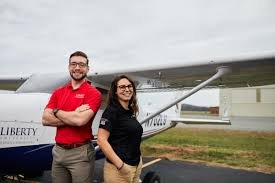Aircraft Maintenance Degree vs. Aviation Management Degree
When embarking on a career in the aviation industry, one of the pivotal decisions you face is selecting the right educational pathway. This choice can profoundly influence your career trajectory and opportunities. Two popular avenues within this dynamic sector are pursuing a Aviation Management degree in Aircraft Maintenance or a degree in Aviation Management. Each pathway offers distinct advantages, career prospects, and educational requirements that are crucial to consider before making your decision.

Understanding the Aircraft Maintenance Degree
An Aircraft Maintenance degree focuses on training students to maintain and repair aircraft to ensure their safety and peak operation. This program equips you with detailed knowledge of aircraft systems, from engines and fuselages to electrical systems and beyond.
Key Aspects of the Aircraft Maintenance Curriculum
- Technical Proficiency: Courses cover in-depth technical aspects of airplane and helicopter maintenance.
- Certifications: This degree often prepares students for obtaining FAA (Federal Aviation Administration) certification as an Airframe and Powerplant (A&P) technician.
- Hands-On Training: Emphasizes real-world skills through hands-on learning in hangars and labs.
Career Paths with an Aircraft Maintenance Degree
- Aircraft Mechanic: Ensuring aircraft are ready for safe flight.
- Aviation Technician: Specializing in specific systems like electrical or propulsion.
- Inspection Authority: Leading safety inspections and maintenance checks.
Exploring the Aviation Management Degree
On the other side, an Aviation Management degree prepares students to handle the business aspects of the aviation industry. This degree is ideal for those who aspire to manage operations at airports or airlines.
Key Components of the Aviation Management Curriculum
- Business Management Skills: Learn business administration within the context of aviation.
- Regulatory and Legal Knowledge: Understanding aviation laws and regulations.
- Operational Management: Courses on managing airport or airline operations effectively.
Career Opportunities with an Aviation Management Degree
- Airport Manager: Overseeing the operation of airport facilities.
- Airline Executive: Managing airline business strategies and operations.
- Aviation Consultant: Advising on aviation business, strategy, and compliance.
Comparing Curriculum and Career Impact
The curriculums for Aircraft Maintenance and Aviation Management degrees diverge significantly, reflecting their focus areas. Aircraft Maintenance is more technical and hands-on, aimed at ensuring aircraft operability and safety. In contrast, Aviation Management emphasizes strategic thinking and business acumen, preparing graduates for leadership roles within the aviation sector.
Salary and Job Outlook
- Aircraft Maintenance Technicians often have a starting salary around $60,000, which can increase significantly with experience and specialized skills.
- Aviation Managers can expect starting salaries typically from $70,000 to $100,000, varying widely with the size of the operation and geographic location.
Industry Demand Both fields enjoy robust demand due to global increases in air travel and the need for heightened aviation safety and efficient management.
Educational Requirements and Timeframe
- Aircraft Maintenance Degree: Generally requires 18-24 months for certification programs or 2-4 years for an associate’s or bachelor’s degree.
- Aviation Management Degree: Typically a 4-year bachelor’s degree program, with options for further graduate studies.
Choosing the Right Path for You
Selecting between these two paths should be based on your personal interests, career goals, and the kind of challenges you wish to tackle in your professional life. If you are inclined towards hands-on technical work and have a keen interest in mechanics and engineering, a degree in Aircraft Maintenance will be suitable. Conversely, if your interests lie in strategy, leadership, and business operations, pursuing a degree in Aviation Management would be ideal.
Before deciding, consider speaking with professionals in the field, visiting educational institutions, and potentially shadowing roles in both areas to gain clearer insights into what each path entails.

Choosing between an Aircraft Maintenance Degree and an Aviation Management Degree depends on your career goals and interests within the aviation industry.
- Aircraft Maintenance Degree:
- Focus: This degree program trains you in the technical aspects of aircraft maintenance, repair, and inspection.
- Skills: You’ll learn how to troubleshoot mechanical issues, perform routine maintenance checks, and ensure aircraft safety and airworthiness.
- Career Opportunities: With this degree, you can work as an aircraft mechanic, technician, inspector, or maintenance manager.
- Advantages: Ideal if you enjoy hands-on work, have a knack for problem-solving, and want to directly contribute to aircraft safety and maintenance.
- Aviation Management Degree:
- Focus: This degree program emphasizes business and management principles as they apply to the aviation industry.
- Skills: You’ll develop skills in aviation operations, airport management, air traffic control, safety regulations, finance, and leadership.
- Career Opportunities: Graduates can pursue careers in airline management, airport operations, aviation logistics, air traffic control, and aviation consultancy.
- Advantages: Suitable for individuals interested in the business side of aviation, who enjoy leadership roles, and want to work in a variety of sectors within the industry.
Consider the following factors when making your decision:
- Personal Interests: Which aspect of aviation interests you the most? Do you prefer hands-on technical work or managerial and administrative roles?
- Career Goals: Where do you see yourself in the aviation industry in the long term? Are you aiming for a career in aircraft maintenance, or do you aspire to manage aviation operations or work in executive roles?
- Job Market: Research the job market and growth prospects for both fields in your desired location. Consider factors such as demand, salary potential, and advancement opportunities.
- Educational Path: Evaluate the curriculum of each degree program, considering courses, internships, and opportunities for specialization.
- Industry Networking: Explore networking opportunities and connections available in each field to gain insights and make informed decisions.
Ultimately, the right choice depends on your individual preferences, career aspirations, and strengths. Some individuals may even choose to combine aspects of both fields through further education or professional development.
Frequently Asked Questions
1. What is an Aircraft Maintenance Degree?
- An Aircraft Maintenance Degree is a specialized program that focuses on teaching students the skills necessary to maintain, repair, and inspect aircraft systems. This degree is highly technical and hands-on.
2. What does an Aviation Management Degree entail?
- An Aviation Management Degree covers the business and operational aspects of the aviation industry. This includes courses on airport management, aviation safety, airline operations, and human resources, among others.
3. What career opportunities are available with an Aircraft Maintenance Degree?
- Graduates can work as aircraft mechanics, avionics technicians, maintenance supervisors, or quality assurance inspectors. This degree is crucial for roles that require detailed technical knowledge of aircraft systems and maintenance protocols.
4. What career paths can I pursue with an Aviation Management Degree?
- This degree prepares students for managerial roles within the aviation industry, such as airline manager, airport operations manager, air traffic controller, or aviation project manager.
5. Which degree should I choose if I’m interested in technical work on aircraft?
- If you’re interested in hands-on technical work involving aircraft systems, the Aircraft Maintenance Degree is the better choice due to its focus on mechanical and technical aspects of aircraft maintenance.
6. Which degree is better for a career in airline operations?
- For careers focusing on the management of airline operations, an Aviation Management Degree would be more appropriate as it provides the necessary background in business and management practices within the aviation context.
7. Are there certifications required in addition to these degrees?
- For Aircraft Maintenance, you will typically need additional certification from a regulatory body such as the FAA in the United States (FAA Airframe and Powerplant certification). For Aviation Management, while not typically required, certifications in project management or airport operations could enhance career prospects.
8. What is the expected salary difference between these two fields?
- Salaries can vary widely based on location, experience, and specific role. Generally, management positions might offer higher salaries but also require more experience or additional qualifications such as an MBA.
9. How long does it typically take to complete each degree?
- Both degrees usually take about four years to complete at the undergraduate level. However, some technical schools or community colleges offer two-year associate degrees in Aircraft Maintenance.
10. Can I switch careers between aircraft maintenance and aviation management later on? – Yes, it’s possible to switch careers, though additional education or certifications might be necessary to transition effectively. For instance, a technician may pursue an Aviation Management Degree to move into management roles, while a manager might undertake specific technical training to understand aircraft maintenance operations better.


